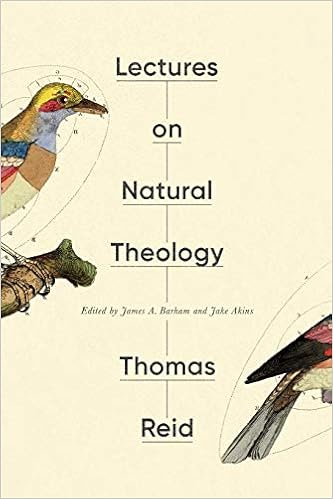The philosopher is Scottish Enlightenment figure Thomas Reid (1710-1796) Thomas Reid (1710-1796), whose Lectures on Natural Theology, edited by James Barham and Jake Akins, are now available to the public:
Thomas Reid (1710-1796) was one of the principal philosophers of the Scottish Enlightenment. A colleague and friend of David Hume and Adam Smith, in 1764 Reid succeeded Smith to the University of Glasgow’s Chair of Moral Philosophy. He is most famous for his work in epistemology, defending common sense (the exercise of our ordinary, inborn cognitive faculties) as the ultimate foundation of human knowledge.
Reid was also an important contributor to the eighteenth-century debate on natural theology, that is, the inference from the evidence of purpose in nature to the existence and attributes of God. Although he never published a separate book on this subject, Reid did give regular lectures on natural theology at the University of Glasgow, of which several sets of student notes have survived. The notes edited, annotated, and published in this volume were from a student of Reid’s who attended his natural theology lectures in the spring of 1780. These lectures have important implications for the history of discussions on the relation between natural science and theology, culminating in the modern Intelligent Design debate.
The Lectures on Natural Theology were not included in the ten-volume Edinburgh Edition of Reid’s collected works. Moreover, while two earlier editions of these lectures exist, both contain serious mistakes of transcription and annotation. For these reasons, this carefully revised edition of this important text fills an important gap in the literature.

From Stanford Encyclopedia of Philosophy:
Thomas Reid (1710–1796) is a Scottish philosopher best known for his philosophical method, his theory of perception and its wide implications on epistemology, and as the developer and defender of an agent-causal theory of free will. In these and other areas he offers perceptive and important criticisms of the philosophy of Locke, Berkeley and especially Hume. He is also well known for his criticisms of Locke’s view of personal identity and Hume’s view of causation. Reid also made influential contributions to philosophical topics including ethics, aesthetics and the philosophy of mind. The legacy of Thomas Reid’s philosophical work is found in contemporary theories of perception, free will, philosophy of religion, and widely in epistemology.
Here’s a podcast on the themes of the book, featuring Jay Richards interviewing one of the editors, James Barham:
On this episode of ID the Future, Jay Richards speaks with James Barham, who’s just edited a new edition of Scottish Enlightenment philosopher Thomas Reid (1710-1796), Lectures on Natural Theology. One of the most readable of all philosophers, Reid is well known for his “common-sense philosophy.” Were he living today, says Barham, he would have certainly been part of the intelligent design movement. Though it’s commonly thought that David Hume refuted Reid’s design arguments, Reid actually produced these lectures after Hume’s death, tracing his design argument back to Plato and Cicero, and did not find Hume’s key anti-design arguments at all persuasive, much less daunting or difficult to rebut. Barham also provides some interesting historical bits about how these lectures came to be written down, and some of the advantages this new resource on Thomas Reid offers over earlier Reid scholarship. Download Episode
A reading of Thomas Reid, taking aim at David Hume’s radical skepticism
Well, here we are, recovering more of our history.